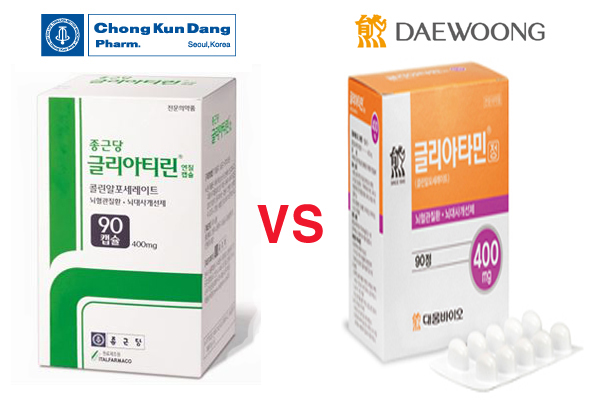Chong Kun Dang Pharmaceutical and Daewoong Pharm are continuing war of nerves over the health authorities’ selection of reference listed drugs (RLD) for Gliatilin (ingredient: choline alfoscerate), a cognition-enhancing therapy developed by Italfarmaco.
The Administrative Court recently ruled in favor of Chong Kun Dang종근당, which claimed that the Central Administrative Appeals Commission had wrongly judged that the Ministry of Food and Drug Safety (MFDS)’s decision over the Gliatilin RLD was unfair.

Daewoong Pharm대웅제약 said on Sept. 21 that it would appeal the court’s decision.
Daewoong Pharm had retained its Gliatilin license in the local market under the contract with Italfarmaco until the Italian firm terminated the contract and newly signed a sales contract with Chong Kun Dang in January 2016.
Daewoong Pharm voluntarily had its product license nullified in March 2016.
This past May, the ministry replaced Daewoong Gliatilin with Chong Kun Dang Gliatilin as the RLD, a benchmark drug for conducting bioequivalence tests in generics development.
In response to the ministry’s replacement, Daewoong Pharm filed a lawsuit against the ministry with the Central Administrative Appeals Commission, claiming that the ministry should nullify its replacement because it decided without a prior notice about RLD change. The company also argued that the ministry’s selection of Chong Kun Dang Gliatilin did not follow due legal procedures and that Chong Kun Dang Gliatilin did not qualify for an RLD, either.
The Central Administrative Appeals Commission recognized Daewoong Pharm’s claims, ruling that the ministry should nullify its selection of Chong Kun Dang Gliatilin as an RLD.
Following the ruling, the ministry reselected Daewoong Gliatilin as the RLD.
To prevent a similar issue from recurring, the ministry revised some criteria for selection of RLDs. The revision stated that RLDs should be: a new drug with manufacturing or import license; a product of original developer with the first license in the local market (the one that has the oldest license among products of original developer); a product that passed the bioequivalence tests using the two drugs mentioned above as RLDs; a product that had the largest demand for medical payments in the previous year from Jan. 1 to Dec. 31; a product that won the first local license; and a product with an unexpired license.
Under the revised criteria, Daewoong Gliatilin was marked as a deleted RLD in May.
However, Chong Kun Dang raised a new issue with the judgment of the Central Administrative Appeals Commission, filing a lawsuit against the commission with the Administrative Court.
Chong Kun Dang said the commission should nullify its order against the ministry, questioning that if Daewoong would have any benefit over its legal fight against Chong Kun Dang following Daewoong Gliatilin’s loss of RLD status. Chong Kun Dang also claimed that the ministry did not commit any wrongdoing by giving a prior notice about RLD change.
The Administrative Court said a public notice about RLD change would not have benefited Daewoong “in a direct and detailed way.” The court also mentioned that the ministry does not confer rights to a drugmaker to request a listing or delisting of its drug as RLD.
As Daewoong had its license voluntarily nullified, before the ministry’s notice on change of the RLD, Daewoong did not have the status as a manufacturer of the RLD at the time, the court said, upholding Chong Kun Dang’s claims.
Daewoong said it would immediately appeal the court’s decision. The company said it did not participate in the administrative trial, thus deprived of a chance to rebut claims of Chong Kun Dang.
“If the Central Administrative Appeals Commission decides to appeal, we will aggressively fight against the court’s judgment,” Daewoong said.
Observers said the two firms’ ongoing conflict, sparked by the handover of Gliatilin sales license from Daewoong to Chong Kun Dang, is likely to continue for some time.

